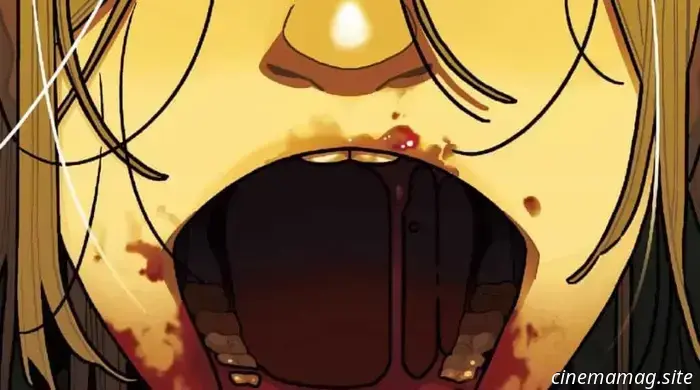
Exclusive Interview with Meredith McClaren, Creator of Meat Eaters
Rachel Bellwoar speaks with Meredith McClaren about her graphic novel, Meat Eaters…
Navigating adulthood is challenging enough without having to adapt to being undead at the same time. This is Ashley's plight in Meredith McClaren’s graphic novel, Meat Eaters. Here’s what McClaren revealed about the project and Ashley's new craving for meat:
For those familiar with your work on Black Cloak (where mermaids have never been more terrifying), creating a horror graphic novel seems like a natural progression. Have you always been a fan of the horror genre?
Meredith McClaren: Ha. Yes and no. As a child, I was frightened by EVERYTHING. Scary movies, horror stories—I couldn’t even glance at a Stephen Gammell cover without breaking out in a cold sweat. But eventually, I flipped a switch and began consuming horror non-stop, starting with shows like Buffy and ghost hunting programs, then moving on to CreepyPastas and the NO SLEEP podcast.
These days, I still startle easily, but ghost stories are a comforting background noise for bedtime.
With Meat Eaters, the horror begins with the cover. Did you have any reservations about opting for such a bloody first image, and what ultimately led you to embrace the grotesque aspect of horror?
MM: Everyone I’ve spoken to has mentioned that the cover is the book's immediate draw, so that suggests we made the right decision.
I proposed several unsettling ideas for the cover, but this one certainly pushes the gore element further. I appreciate that it clearly indicates what readers can expect. I wouldn’t want it confused with any other type of book.
While Black Cloak is set in a fantasy realm, Meat Eaters takes place in the real world where monsters exist, but most people are unaware. What drew you to telling a story where Ashley must conceal her supernatural identity?
MM: It felt logical because much of what Ashley contends with are deeply personal issues. She starts off as a very isolated individual with a minimal social life. She doesn’t answer to anyone at home. Her problems are her own and not meant for sharing. This applies to both her surroundings and later her supernatural condition.
Plus, I enjoy the notion that there’s always something 'extra' lurking just at the edges of our world. I prefer stories that make me believe I could stumble upon something extraordinary.
Ashley is frequently mistaken for a zombie, but she's actually a ghoul. Did you ever consider making Ashley a zombie, or were you always committed to her being a ghoul?
MM: 😉
I was always determined to make her a ghoul.
The short answer is that zombies, as popularly depicted, lack any sentience. That would have created a very different narrative.
The more detailed explanation is that people typically feel they understand the rules for zombies. While there are films that bend those rules—28 Days Later made them fast, while Land of the Dead allowed them to perform repetitive actions from their lives—there's a general familiarity with zombies' criteria, at least in Western culture. I wanted something a bit more ambiguous, where the audience, like Ashley, is uncertain about the norms.
It's also amusing to keep making 'zombie' jokes at Ashley's expense.
By opting for a ghoul, do you think there were more chances to explore the aesthetics and mythology surrounding ghouls?
MM: Ghouls have a rich folklore history.
In high school, I took on a significant personal project to catalog different types of undead creatures worldwide. I told myself it was research for a grand story, but I ultimately didn’t progress beyond the initial information gathering.
I had a large world map and used different colored pins for each type of undead. So there's certainly a wealth of lore I could explore and incorporate. The same applies to vampires, werewolves, and zombies. The Western understanding of these concepts is merely one interpretation of ideas that are actually widespread. Almost every region has its version of these beings.
I also appreciate the idea of leaving things somewhat ambiguous for the audience, and even for the characters, regarding the boundaries of the creatures in Meat Eaters. For instance, you never actually SEE the vampires in direct sunlight, but no one explicitly states that it can't happen.
I think it feels more true to life to have those blurred edges rather than explicit rules.
Throughout the book, Ashley's friend, Motley, attempts to engage in activities she's been told are fun by the media, only to feel let down. Is that something you can relate to?
MM: VERY MUCH SO.
I spent a considerable amount of my teenage and young adult years reflecting on the media I was consuming and comparing it to my real desires and expectations for life. There was a significant divide, which caused a lot of internal conflict as I looked at beloved franchises and characters, questioning, ‘



Other articles
-Movie-Review.jpg) Daniela Forever (2025) - Film Review
Daniela Forever, 2025. Written and Directed by Nacho Vigalondo. Featuring Henry Golding, Beatrice Grannò, Aura Garrido, Rubén Ochandiano, Nathalie Poza, Pilar Bergés, Godeliv Van den Brandt, Frank Feys, and Rocío Saiz. SYNOPSIS: Centers on a man participating in a sleep trial that enables him to reconstruct his life with his girlfriend who passed away in an […]
Daniela Forever (2025) - Film Review
Daniela Forever, 2025. Written and Directed by Nacho Vigalondo. Featuring Henry Golding, Beatrice Grannò, Aura Garrido, Rubén Ochandiano, Nathalie Poza, Pilar Bergés, Godeliv Van den Brandt, Frank Feys, and Rocío Saiz. SYNOPSIS: Centers on a man participating in a sleep trial that enables him to reconstruct his life with his girlfriend who passed away in an […]
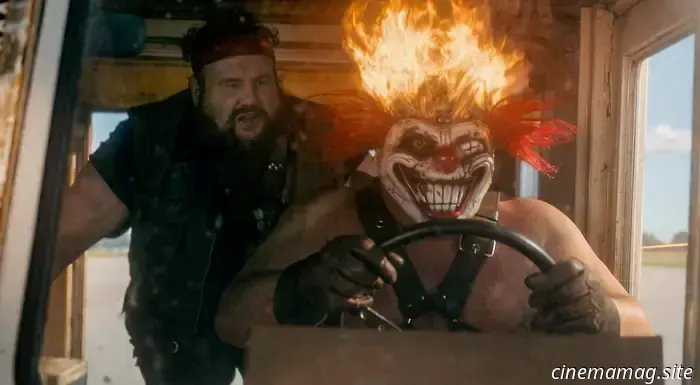 The Twisted Metal season 2 trailer has officially dropped!
With only three weeks remaining until the second season of Twisted Metal premieres, a new trailer and poster have been released online for the video game adaptation. The storyline follows John's (Anthony Mackie) life becoming increasingly complicated when he reconnects with his long-lost sister, all while he participates in a sinister demolition derby alongside Quiet (Stephanie Beatriz); take […]
The Twisted Metal season 2 trailer has officially dropped!
With only three weeks remaining until the second season of Twisted Metal premieres, a new trailer and poster have been released online for the video game adaptation. The storyline follows John's (Anthony Mackie) life becoming increasingly complicated when he reconnects with his long-lost sister, all while he participates in a sinister demolition derby alongside Quiet (Stephanie Beatriz); take […]
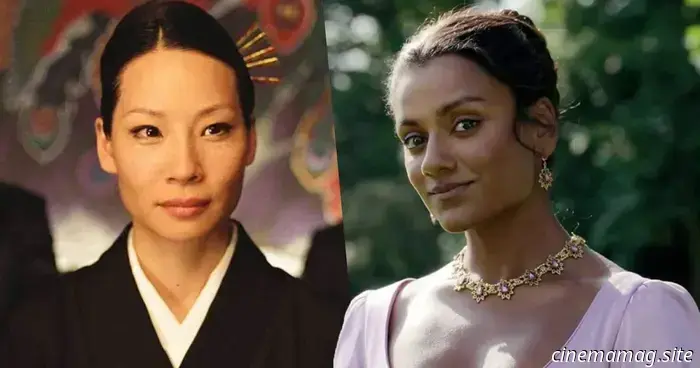 The cast of The Devil Wears Prada 2 includes Simone Ashley, Lucy Liu, Justin Theroux, and others.
The sequel to The Devil Wears Prada 2 has finalized its cast, featuring returning stars Meryl Streep, Anne Hathaway, Emily Blunt, and Stanley Tucci, along with the recent addition of Kenneth Branagh. Newcomers joining the original cast include Simone Ashley (Bridgerton), Lucy Liu (Charlie’s Angels), Justin Theroux (Beetlejuice), B.J. Novak (The Office), and Pauline Chalamet (The Sex …).
The cast of The Devil Wears Prada 2 includes Simone Ashley, Lucy Liu, Justin Theroux, and others.
The sequel to The Devil Wears Prada 2 has finalized its cast, featuring returning stars Meryl Streep, Anne Hathaway, Emily Blunt, and Stanley Tucci, along with the recent addition of Kenneth Branagh. Newcomers joining the original cast include Simone Ashley (Bridgerton), Lucy Liu (Charlie’s Angels), Justin Theroux (Beetlejuice), B.J. Novak (The Office), and Pauline Chalamet (The Sex …).
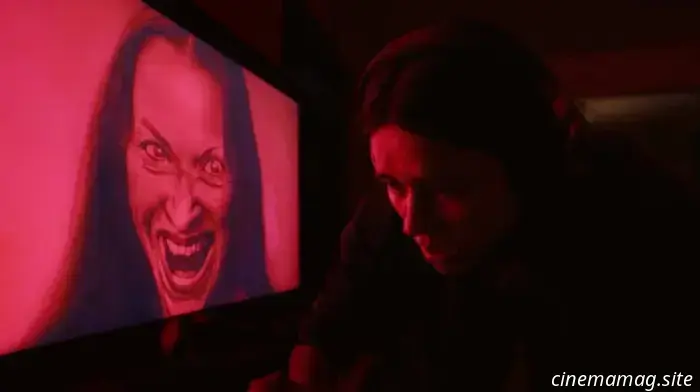 Nina Kiri plays the role of a paranormal podcaster in the horror film The Undertone by Black Fawn.
Black Fawn Films has revealed their newest horror project, The Undertone, featuring Nina Kiri (The Handmaid’s Tale) as the host of a paranormal podcast. In the film, she begins to receive a series of haunting messages that may be linked to her ailing mother’s life. Below, we present the first look images of the movie in advance of its premiere at the Fantasia International […]
Nina Kiri plays the role of a paranormal podcaster in the horror film The Undertone by Black Fawn.
Black Fawn Films has revealed their newest horror project, The Undertone, featuring Nina Kiri (The Handmaid’s Tale) as the host of a paranormal podcast. In the film, she begins to receive a series of haunting messages that may be linked to her ailing mother’s life. Below, we present the first look images of the movie in advance of its premiere at the Fantasia International […]
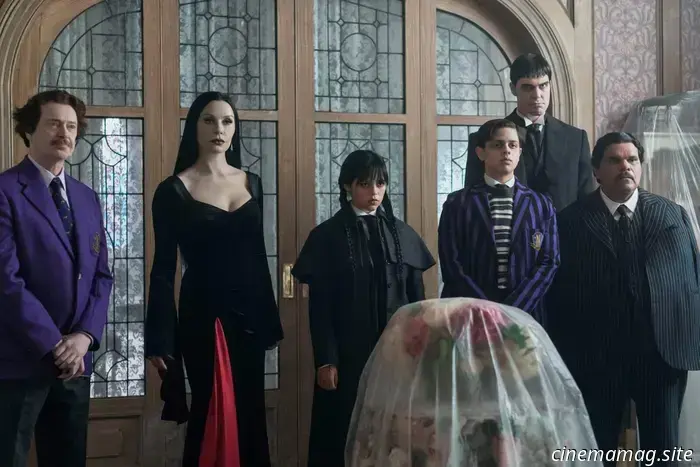 Netflix released the season 2 trailer and promotional images for Wednesday.
With less than a month remaining before Part 1 of the eagerly awaited second season of Wednesday arrives on Netflix, the streaming service has released a new trailer for the Addams Family spinoff series. In it, Jenna Ortega's character, a student at Nevermore Academy, navigates the challenges posed by an overly eager new principal and a cunning stalker on campus while she grapples with…
Netflix released the season 2 trailer and promotional images for Wednesday.
With less than a month remaining before Part 1 of the eagerly awaited second season of Wednesday arrives on Netflix, the streaming service has released a new trailer for the Addams Family spinoff series. In it, Jenna Ortega's character, a student at Nevermore Academy, navigates the challenges posed by an overly eager new principal and a cunning stalker on campus while she grapples with…
Exclusive Interview with Meredith McClaren, Creator of Meat Eaters
Rachel Bellwoar speaks with Meredith McClaren about her graphic novel, Meat Eaters. Navigating adulthood is challenging enough without the added complexity of adjusting to being undead. This is the predicament faced by Ashley in McClaren's graphic novel. Here’s what McClaren had to say regarding the project and Ashley’s unexpected craving for meat: For fans of […]
